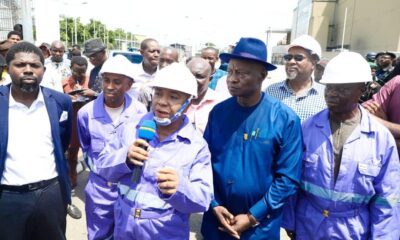Oil & Energy
Gas As Ultimate Resource For Power Generation
Gas utility as a major resource for electricity generation is beginning to take the fron-tis-piece in Nigeria’s power sector. The product before now was limited to providing cheap energy for cooking but its necessity and impact in power generation has become so significant that the problem of regular electricity supply in this country can only be aggressively addressed with the use of gas.
There is increasing interest among Federal and State Governments as well as companies towards absolute utilisation of gas to facilitate electricity generation.
The Federal Government’s focus now is on how to increase gas supply to power plants in this country through the aggressive execution of the on-going 12 –month gas emergency time line to fire the gas-to-power scheme.
On its part, the Kwara State Government is already discussing with some investors that would use gas to generate electricity for the state. The Governor, Abiola Ajimobi acknowledged the importance of gas pipeline to the development agenda of his administration, when the House of Representatives Committee on Petroleum (Downstream) led by its Chairman, Hon. Dakuku Peterside visted him at Ibadan recently on oversight function to assess NNPP facilities there. Peterside directed that faulty gas pipelines should be repaired without delay.
The managing Director, Shell Petroleum Development Company (SPDC), Mutiu Sunmonu said Shell is taking adeguate steps to improve gas supply to power plants in the country, pointing out that the company’s Utorogu Gas Plant in Ugheli, Delta State currently products 250 million standard cubic feet per day (mmscf/d) while work is going on at a new plant designed to increase capacity to about 510 mmscf/d which will have significant impact on power generation.
While the Ministry of Power Resources, Nigerian National Petroleum Corporation (NNPC), International Oil Companies and the Nigeria Gas Company (NGC) are making efforts to bridge the gap in gas supply, the Managing Director of Niger Delta Power Holding Company (NDPHC), Mr. James Olotu says the delivery of the 1,025 megawatts into the national grid would be dependent on the availability of gas. He said that many power stations across the country are facing gas constraints which is being already addressed by the Federal Government.
According to him, Omotosho Power Plant has commenced operation and 70 megawatts added to National Grid through the plant, noting that in Sapele power station, only one unit can be fired, out of the three units because of gas constraints. With its unending complaints and sharp practices among the staff, the Power Holding Company of Nigeria (PHCN) is owing the Nigeria Gas Company an over N40 billlion for gas supplied.
In 2010, government’s efforts at improving power supply got a boost with the commencement of gas supply to PHCN facilities through the NGC and via the Pan Ocean Oil Corporation (POOC), operator of the NNPC Pan Ocean Joint Venture. POOC currently supplies 50 million standard cubic feet per day (mmscf/f) of gas to the NGC from its Ovade-Ogharefe gas processing plant.
Pan Ocean managing Director, Mr. Festus Fadeyi once said. “We are very pleased that Pan Ocean is leading the flare-out agenda of the Federal Government and has commenced supply of gas to increase power generation to the national electricity grid”.
Nigeria Liquefied Natural Gas (NLNG), Brass Managing Director, Mr. Vincenzo Diloriuzo noted that there is enough gas in the country to ensure the success of the LNG project.
Government has over the time showed lack of political will in the issue of gas flare. Gas flare has negative effect on man and environment yet nothing was done, it takes a strong political will to actualise the gas-to-power agenda of the present administration vis-à-vis adequate generation, distribution and transmission of electricity through availability of sufficient gas. At the moment, gas produced for local consumption has grown to 930 million standard cubic feet per day (mmscf/d) and power generation from gas is more than 1829 megawatts.
Nigeria is adjudged the world’s 7th largest producer of high grade gas with zero per cent sulphur and rich in natural gas liquids with proven huge reserves of more than 182 tonnes per cubic feet, so our gas capacity should be enough to achieve the gas-to-power aspiration of the Federal Government, and make gas readily available to industrial customers that should in turn generate accelerated growth of manufacturing. We have a number of oil and gas companies that control a considerable share of the gas distribution here in the country and generally the gas market worldwide.
Utilising such companies maximally will facilitate the country’s power projects.
Not just international oil companies should participate in the gas project but indigenous firms should be given priority attention or consideration. Gas to power distribution is the boost the country actually needs now and there must be a corrupt –free national strategy for managing the gas revenues.
In his Democracy Day nationwide broadcast, President Goodluck Jonathan announced the government’s plan to ensure reliable power supply through the judicious implementation of the power sector road map which is at an advanced stage to fully privatise the generation and distribution of electricity to all levels of the country.
According to him, his administration is committed to the provision of regular and uninterrupted power supply, which he said remains unwavering, adding “we all agree that adequate and regular power supply will be the significant figure to enhance transmission with capacity and accelerate growth. It is for this reason that I remain optimistic that the reform we have initiated, the decisions we have taken so far and the plans we intend to strictly prosecute will yield desired result”.
He disclosed that to underline this commitment, a special session on power was convened to engage Custain Construction Company in contracting for gas production and delivery to ensure enough availability of power.
The President directed that the power sector reform was concluded on schedule and that the privatisation of the sector will be completed according to plan. The privatisation process, he noted, has attracted expression of interest from 131 companies across the globe.
The Federal Government has a two-point approach to the power agenda which are immediate repair of power plants as well as transmission and distribution of infrastructure in the short term and the building of power stations and provision of enablance to attract investors. It is also committed to accelerating the completion of the National Independent Power Project (NIPP) while building about 4,000 Kilometers of transmission lines and hundreds of substations, just as the design for the construction of hydro-power plants which will add about 3,000 megawatts to the national grid has been completed.
The National gas Emergency plan has not helped the problem of gas supply due to poor planning.
One yardstick to measure the level of development of any nation is its power generating capacity. Power is a critical element as it drives growth and development.
In Nigeria, generating adequate power to drive the economy has been a nagging problem and the problem continues to be insurmountable as efforts by previous governments could not yield the desired results. The availability of reliable electricity power to homes and businesses of our citizens has been one item in our national life that we have approached with so much hope and yet experiencing so much frustration over the past decades.
In recent decades, subsequent regimes have put in billions of naira to reverse the neglect and mismanagement which has characterised the power sector. The President Jonathan-led administration has expressed the commitment to bring an end to the nation’s stunted growth and usher in the fresh air of prosperity by pursuing a new era of sector-wide reform, which is driven by improved service delivery to every class of customer in the Nigeria electricity sector.
This prompted Jonathan to set up the Presidential Action Committee on Power, which he explained was to eliminate bureaucracy and inefficiency in decision-taking. He expressed the hope that the power sector reforms would succeed like that of the telecommunications sector.
Gas fired plants had been established across the country, capable of generating between 25,000 megawatts and 30,000 MW and many investors have indicated interest to invest in the power sector, so the problem of lack of gas to run existing power plants must be resolved to ensure that sufficient gas is available for more power plants that are being planned.
Nigerians are complaining that in spite of poor power supply, they are paying high electricity bills and they are expecting the government to quicken the installation of pre-paid meter in every household so that people pay for what they consume. A good number of Nigerians are also expecting President Jonathan to make a difference and to be the first leader to permanently solve the power problem in this country.
There are challenges which if not properly addressed by the government could truncate the growth plans in the gas to power initiative which include funding, regulations, sanctity of contract and community issues amongst others. The government must look into them critically and urgently too. A situation where local finance institutions are not able to muster the finance for gas sector investment even after the capitalisation exercise is totally unacceptable and will not urgur well for the sector.
Shedie Okpara
Oil & Energy
FG Explains Sulphur Content Review In Diesel Production
The Federal Government has offered explanation with regard to recent changes to fuel sulphur content standards for diesel.
The Government said the change was part of a regional harmonisation effort, not a relaxation of regulations for local refineries.
The Chief Executive, Nigerian Midstream and Downstream Petroleum Regulatory Authority (NMDPRA), Farouk Ahmed, told newsmen that the move was only adhering to a 2020 decision by the Economic Community of West African States (ECOWAS) which mandated a gradual shift to cleaner fuels across the region.
Ahmed said the new limits comply with the decision by ECOWAS that mandated stricter fuel specifications, with enforcement starting in January 2021 for non-ECOWAS imports and January 2025 for ECOWAS refineries.
“We are merely implementing the ECOWAS decision adopted in 2020. So, a local refinery with a 650 ppm sulphur in its product is permissible and safe under the ECOWAS rule until January next year where a uniform standard would apply to both the locally refined and imported products outside West Africa”, Ahmed said.
He said importers were notified of the progressive reduction in allowable sulphur content, reaching 200 ppm this month from 300 ppm in February, well before the giant Dangote refinery began supplying diesel.
Recall that an S&P Global report, last week, noted a significant shift in the West African fuel market after Nigeria altered its maximum diesel sulphur content from 200 parts per million (ppm) to around 650 ppm, sparking concerns it might be lowering its standards to accommodate domestically produced diesel which exceeds the 200 ppm cap.
High sulphur content in fuels can damage engines and contribute to air pollution. Nevertheless, the ECOWAS rule currently allows locally produced fuel to have a higher sulphur content until January 2025.
At that point, a uniform standard of below 5 ppm will apply to both domestic refining and imports from outside West Africa.
Importers were previously permitted to bring in diesel with a sulphur content between 1,500 ppm and 3,000 ppm.
It would be noted that the shift to cleaner fuels aligns with global environmental efforts and ensures a level playing field for regional refiners.
Oil & Energy
PHED Implements April 2024 Supplementary Order To MYTO
The Port Harcourt Electricity Distribution (PHED) plc says it has commenced implementation of the April 2024 Supplementary Order to the MYTO in its franchise area while assuring customers of improved service delivery.
The Supplementary order, which took effect on April 3, 2024, emphasizes provisions of the MYTO applicable to customers on the Band A segment taking into consideration other favorable obligations by the service provider to Band A customers.
The Head, Corporate Communications of the company, Olubukola Ilvebare, revealed that under the new tariff regime, customers on Band A Feeders who typically receive a minimum supply of power for 20hours per day, would now be obliged to pay N225/kwh.
“According to the Order, this new tariff is modeled to cushion the effects of recent shifts in key economic indices such as inflation rates, foreign exchange rates, gas prices, as well as enable improved delivery of other responsibilities across the value chain which impact operational efficiencies and ability to reliably supply power to esteemed customers.
“PHED assures Band A customers of full compliance with the objectives of the new tariff order”, he stated.
Ilvebare also said the management team was committed to delivering of optimal and quality services in this cost reflective dispensation.
The PHED further informed its esteemed customers on the other service Bands of B, C D & E, that their tariff remains unchanged, adding that the recently implemented supplementary order was only APPLICABLE to customers on Band A Feeders.
Oil & Energy
PH Refinery: NNPCL Signs Agreement For 100,000bpd-Capacity Facility Construction

The Nigerian National Petroleum Company Ltd (NNPCL) has announced the signing of an agreement with African Refinery for a share subscription agreement with Port-Harcourt Refinery.
The agreement would see the co-location of a 100,000bpd refinery within the Port-Harcourt Refinery complex.
This was disclosed in a press statement on the company’s official X handle detailing the nitty-gritty of the deal.
According to the NNPCL, the new refinery, when operational, would produce PMS, AGO, ATK, LPG for both the local and international markets.
It stated, “NNPC Limited’s moves to boost local refining capacity witnessed a boost today with the signing of share subscription agreement between NNPC Limited and African Refinery Port Harcourt Limited for the co-location of a 100,000bpd capacity refinery within the PHRC complex.
“The signing of the agreement is a significant step towards setting in motion the process of building a new refinery which, when fully operational, will supply PMS, AGO, ATK, LPG, and other petroleum products to the local and international markets and provide employment opportunities for Nigerians.
By: Lady Godknows Ogbulu
-

 News3 days ago
News3 days agoBonny-Bodo Road: FG Offers Additional N20bn, Targets December Deadline
-
Business3 days ago
Nigeria Set To Get $2.25bn World Bank Loan … Plans Diaspora Bond
-

 Rivers10 hours ago
Rivers10 hours agoCleric Attributes Nigeria’s Unity To God’s Grace
-

 Oil & Energy7 hours ago
Oil & Energy7 hours agoReps Committee Summons Kyari, Others Over Environmental Degradation
-

 Niger Delta3 days ago
Niger Delta3 days agoMile One Market: Committee Commences Verification Exercise …Denies Allocations Of Shops
-
Sports3 days ago
Chairman Lauds NPFL Referees Improvement
-

 News8 hours ago
News8 hours agoNDLEA Intercepts Cakes Laced With Drugs
-

 Environment7 hours ago
Environment7 hours agoFG Unveils Framework For Washcom Formation, Management

